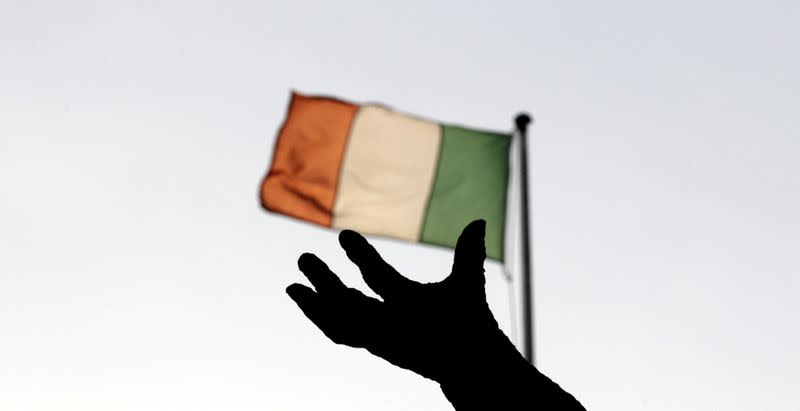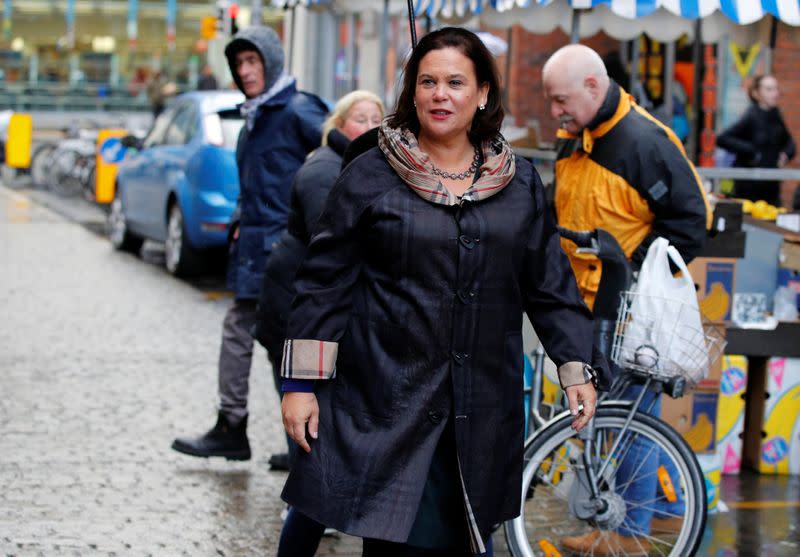Irish parliament returns with weeks of government talks ahead
By Padraic Halpin and Graham Fahy
DUBLIN (Reuters) - Ireland's Fianna Fail will start formal talks next week to try to form a government from a fractured parliament as contenders for prime minister fell well short of doing so at the first sitting since the Feb. 8 election.
Left-wing nationalists Sinn Fein shocked the establishment by securing the most votes but ran too few candidates to win the most seats, instead leaving it, centre-right Fianna Fail and Prime Minister Leo Varadkar's Fine Gael each controlling just under a quarter of the parliament.
Sinn Fein's Mary Lou McDonald secured the most support beyond her own lawmakers in the first ballot for prime minister, adding eight left-wing votes to her 37 Sinn Fein deputies, which left her far short of the 80 required to form a government.
The other two main parties' refusal to govern with Sinn Fein, the former political wing of the Irish Republican Army, puts Fianna Fail in pole position, even after leader Micheal Martin secured the support of just four independent lawmakers in addition to his own 37 deputies.
Fianna Fail are the largest party in parliament with 38 elected deputies, but one was re-elected as speaker earlier in Thursday's session and does not vote.
Fianna Fail will open talks with the smaller Green Party next Wednesday but has acknowledged that some kind of tie-up with historical rival Fine Gael will ultimately be the only way to avoid a second election Sinn Fein would likely relish.
"At some stage in order to put a stable government together, there will have to be a conversation with Fine Gael but we're a long way off that," Fianna Fail's deputy leader Dara Calleary told national broadcaster RTE earlier on Thursday.
Martin told reporters he would speak later on Thursday to Varadkar, who has said he is preparing Fine Gael for opposition after it fell to third place on 35 seats, but that it would help form a government if all other options are exhausted.
Varadkar was obliged to put his name forward for re-election as prime minister and will assume the role on a caretaker basis until a new government is formed.
It took Varadkar's predecessor Enda Kenny four such votes and 70 days to form an administration after the last election in 2016.
Green Party leader Eamon Ryan, whose 12 deputies would give any combination of two of the three biggest parties a majority, said he hoped a prospective coalition would take shape within the next two weeks but that it would likely be late March or early April before any policy programme would be agreed.
The Greens will also meet Sinn Fein next week and has not stated a preference for coalition.
McDonald, who has said a Fianna Fail-Fine Gael coalition would be "a slap in the face to the Irish electorate", hoped for a change of mind from Fianna Fail on her party, although there is so far little sign of that.
Her centre right rivals made a point of letting McDonald try to form a left wing-led government without them, knowing she was highly unlikely to succeed. Some of the non-Sinn Fein deputies who backed McDonald on Thursday said they would withdraw their support if she went into coalition with Fianna Fail.
"It seems to me that if there is to be movement, you have to get Fianna Fail and the Greens to come together and then go to Fine Gael with some sort of agreement," said Gary Murphy, professor of politics at Dublin City University.
"Otherwise you're back at the polls and ultimately Fianna Fail and Fine Gael won't want an election any time soon."
(Reporting by Padraic Halpin and Graham Fahy; editing by Christina Fincher and Jonathan Oatis)

 Yahoo News
Yahoo News 



